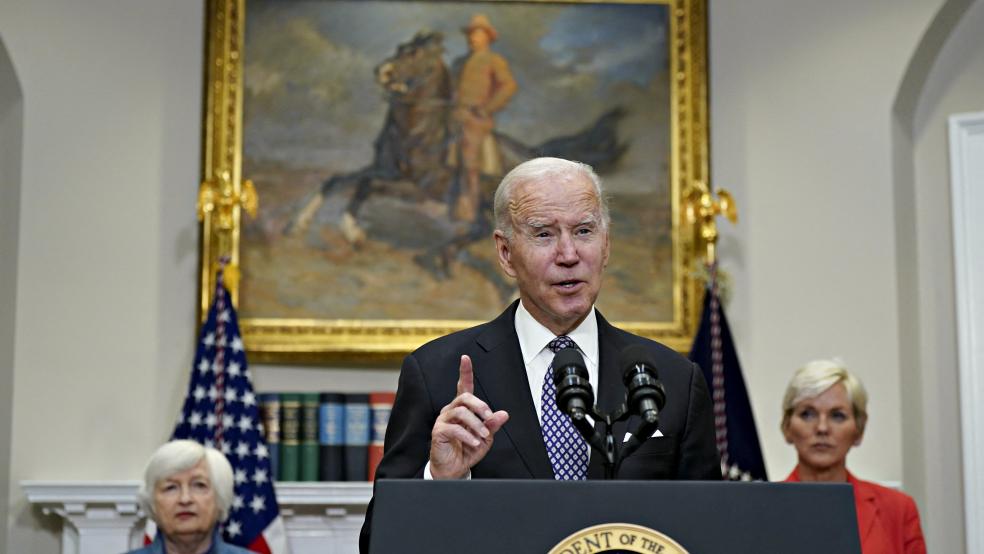President Joe Biden on Monday stepped up his pressure on major oil companies, accusing them of racking up record earnings by profiteering off the war in Ukraine. In a speech at the White House, Biden charged that the oil producers are neglecting their wartime responsibilities by refusing to take steps to lower prices at the pump for the American drivers — and he threatened to impose a tax on the companies’ excess profits if they don’t ramp up production.
The oil industry, Biden said, “has not met its commitment to invest in America and support the American people. One by one, major oil companies have reported record profits. Not just fair a return for hard work — every company is entitled to that, a fair return for work they do, innovation they generate. But I mean profits so high it’s hard to believe.”
Biden pointed to earnings results from Shell, which last week reported $9.5 billion in profits for the third quarter — more than twice as much as the same period a year ago — and ExxonMobil, which announced profits of $19.7 billion for the quarter, the highest in the company’s history and nearly triple what it earned in the same quarter a year earlier.
“In the last six months, six of the largest oil companies have made more than $100 billion,” Biden said. “I think it’s outrageous the size of the profits. … It’s time for these companies to stop war profiteering.”
Flanked by Treasury Secretary Janet Yellen and Energy Secretary Jennifer Granholm, Biden said that if the companies were making the average profit they had earned over the last 20 years and passed the rest onto consumers, the price of gasoline would come down by 50 cents a gallon. “Rather than increasing their investments in America or giving American consumers a break, their excess profits are going back to their shareholders and buying back their stock so executive pay is going to skyrocket. Give me a break. Enough is enough.”
The oil industry has been wary of Biden’s efforts to increase production, especially given the administration’s efforts to speed the transition to clean energy sources. The industry also argues that a windfall profits tax will only decrease domestic production. “Rather than taking credit for price declines and shifting blame for price increases, the Biden administration should get serious about addressing the supply and demand imbalance that has caused higher gas prices and created long-term energy challenges,” American Petroleum Institute CEO Mike Sommers said in a statement. “Oil companies do not set prices—global commodities markets do. Increasing taxes on American energy discourages investment in new production, which is the exact opposite of what is needed.”
In Exxon’s earnings call with analysts last week, CEO Darren Woods last week indicated that he has heard the calls to give drivers a break. “There has been discussion in the U.S. about our industry returning some of our profits directly to the American people,” Woods said, according to Bloomberg News. “That’s exactly what we’re doing in the form of our quarterly dividend.” Biden responded on Twitter: “Can’t believe I have to say this, but giving profits to shareholders is not the same as bringing prices down for American families.”
Gas prices have been drifting lower and now average $3.76 a gallon, down about four cents from a month ago but up 36 cents from a year ago, according to AAA.
Why it matters: With a week to go before Election Day, Biden and Democrats remain eager to demonstrate that they are working to address the high inflation that voters say in a top concern. But a windfall profits tax — an idea embraced by some key Democrats — would be extremely difficult to implement even if the president’s party retains control of Congress.
“Biden set out a promise that will be all but impossible to deliver,” Bloomberg’s Akayla Gardner, Jennifer A Dlouhy and Kevin Crowley write. “Many Democrats have unsuccessfully sought a so-called windfall profit tax for more than a decade. No such proposal is likely to pass the current Senate, evenly divided between Democrats and Republicans, and unless Biden’s party makes unexpected gains in next week’s elections, the GOP and centrist Democrats will be able to block it for the foreseeable future.”





